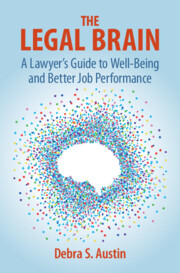Book contents
- The Legal Brain
- The Legal Brain
- Copyright page
- Dedication
- Contents
- Acknowledgments
- Introduction
- 1 The Impaired Lawyer
- 2 The Spectrum from Languishing to Flourishing
- 3 The Lawyering Culture
- 4 The Lawyer’s Brain
- 5 Memory, Knowledge, and Building Expertise
- 6 Motivation, Reward, and Developing Habits
- 7 The Impact of Stress
- 8 The Influence of Self-Medication
- 9 The Importance of Fuel
- 10 Optimizing Brain Health
- 11 Enhancing Mental Strength
- 12 Developing an Action Plan for the Neuro-intelligent Lawyer
- 13 The Neuro-intelligent Legal Organization
- Conclusion
- Select Bibliography
- Index
11 - Enhancing Mental Strength
Published online by Cambridge University Press: 08 May 2024
- The Legal Brain
- The Legal Brain
- Copyright page
- Dedication
- Contents
- Acknowledgments
- Introduction
- 1 The Impaired Lawyer
- 2 The Spectrum from Languishing to Flourishing
- 3 The Lawyering Culture
- 4 The Lawyer’s Brain
- 5 Memory, Knowledge, and Building Expertise
- 6 Motivation, Reward, and Developing Habits
- 7 The Impact of Stress
- 8 The Influence of Self-Medication
- 9 The Importance of Fuel
- 10 Optimizing Brain Health
- 11 Enhancing Mental Strength
- 12 Developing an Action Plan for the Neuro-intelligent Lawyer
- 13 The Neuro-intelligent Legal Organization
- Conclusion
- Select Bibliography
- Index
Summary
Research has shown that the state of your mental health has an impact on your physical health; thus, ameliorating mental health problems might improve physical health, extend lifespan, and reduce healthcare costs. Not every tool or practice works for every person. It takes some experimentation to learn which techniques effectively calm your fight-or-flight response and engage your rest-and-digest recovery system. Those who are willing to try might just gain a competitive edge. Mentally strong people are willing to learn new modes of self-development, adapt to our constantly changing world, take responsibility for their improvements and periodic failures, and assume control of their lives. They do not let negative environments or distractions deter them from their goals. The research-based practices here are divided into exercises that address specific obstacles to mental strength (perfectionism, imposter syndrome, pessimism, emotion regulation, and self-awareness of introversion, extroversion, and neurosignature strengths) and proactive strategies to empower your rest-and-digest system (growth mindset, mindfulness, meditation, nature therapy, creative play, and interacting with dogs).
Keywords
- Type
- Chapter
- Information
- The Legal BrainA Lawyer's Guide to Well-Being and Better Job Performance, pp. 154 - 188Publisher: Cambridge University PressPrint publication year: 2024

